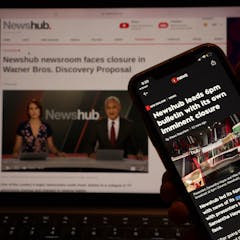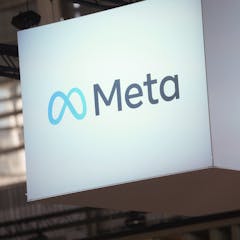
Articles on Facebook
Displaying 1 - 20 of 1009 articles

Meta, the parent company of Facebook, has already switched news off in Canada. Australia could easily be next – here’s what that might lead to.

Florida and Texas sought to prevent social media companies from deciding which posts can be promoted, demoted or blocked. The Supreme Court said the tech companies can moderate as they please.

A new report has found that 15 per cent of English-speaking Canadians are paying for news in 2024, compared to 11 per cent in 2023. But it is too early to rejoice.

Burn Book is is a witty and engaging account of the rise (and often fall) of internet companies and the often dysfunctional talents behind them, told by an exceptionally well-connected outsider.

A scholar of militia activity observes extremists stepping back into the public sphere after a few years of being less visible.

The global trade in data means minor drug dealing by 16-year-olds on social media could hurt their ability to get a job, house or insurance in their 30s.

People participate in online communities to share experiences and sympathy. AI chatbots that join the conversation can only pretend to offer either.

Is a cellphone ban, along with increased surveillance, the right way to deal with the impact of addictive and harmful technology in classrooms?

As wildfire season approaches, Canadians —especially northerners and Indigenous Peoples — are being let down by Meta and their government when they need them most.

Visually appealing and cheap to produce, AI-generated images allow scammers and spammers to post high volumes of engaging content − and Facebook’s algorithm may be promoting these posts.

Four Canadian school boards are suing social media giants. This comes as 95 per cent of Ontario schools report needing more resources to support student mental health.

A new change to Meta’s apps will see users no longer recommended political content by default. The ramifications of this will be far-reaching.

New research shows that even after Facebook made changes to stem the tide of dangerous pandemic misinformation, some accounts continued to thrive.

Platforms like Facebook, Instagram and TikTok vie for our attention and boast billions of users. Ultimately, what matters is connection.

Online extremism is a unique challenge – terrorists use methods that can’t be captured by standard content moderation. So, what can we do about it?

As political parties desperately battle for voters’ attention, cybersquatting is one of many online tools in the toolkit. It’s only effective at further diminishing trust in government.

Australia needs to prioritise finding new funding to support journalism, particularly in remote and regional areas.

Calls for the Fair News Digital Bargaining Bill to be fast-tracked are misguided. A better solution would be a straight levy on digital advertising to fund public interest news production.

The news page on Facebook will go, and with it, the flow of money to some Australian media outlets. But will the news content disappear too?

Australian fans who didn’t manage to snag Eras tickets are on the hunt – and scammers are capitalising on this. Here’s everything you need to know to protect yourself.
